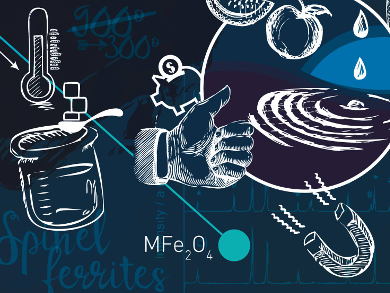Deep eutectic solvents (DESs) are melts which are related to ionic liquids. They consist of a hydrogen-bond acceptor (usually choline chloride) and a hydrogen-bond donor, which form a mixture that has a considerably lower melting point than either component. They are nontoxic, inexpensive, and do not accumulate in the environment. As such, they are an appealing alternative to inorganic acids or organic solvents. During the past decade, DESs have been used as alternative solvents for catalytic and biocatalytic reactions, as well as in the processing of metals for purposes such as electrodeposition and metal extraction.
In light of the solubility of metal oxides in DESs, Burkhard König, University of Regensburg, Germany, and colleagues have developed a synthesis of nanoparticles of spinel-type ferrites, mixed metal oxides with the formula MFe2O4 (M = Mg, Co, Ni). The team added Fe2O3 and the respective metal oxide to the DESs in a molar ratio of 1:1 and stirred at 80 °C for two hours. The melts were then calcined in a muffle furnace.
Most established routes to ferrite nanoparticle synthesis suffer from problems in upscaling, high costs, or the need for extreme conditions. By using DESs, the researchers were able to synthesize phase-pure Mg, Co, and Ni ferrites at low temperatures from unmodified metal oxide starting materials, without any need for corrosive acids.
- Preparation of Magnesium, Cobalt and Nickel Ferrite Nanoparticles from Metal Oxides using Deep Eutectic Solvents,
Anika Söldner, Julia Zach, Melanie Iwanow, Tobias Gärtner, Marc Schlosser, Arno Pfitzner, Burkhard König,
Chem. Eur. J. 2016.
DOI: 10.1002/chem.201602821




